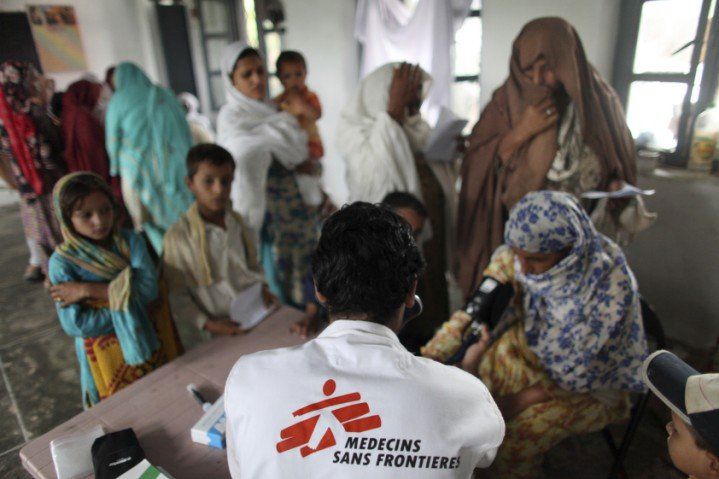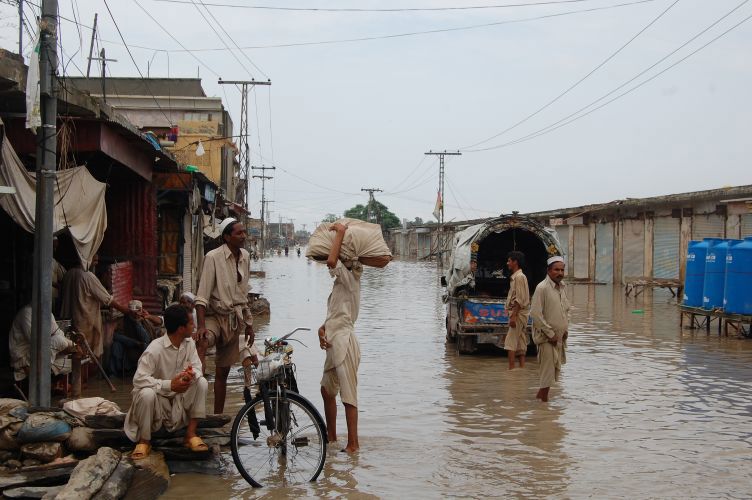“Catastrophic” situation found in Charsadda and Nowshera districts
Although water is receding in some areas, the needs of people who have had to leave their homes are increasing and becoming more and more urgent.
MSF’s response is increasing and focusing on providing drinking water, basic relief items and medical care.
"It is very difficult to get a complete picture of the extent of the needs," said Alan LEFEVRE, MSF Emergency coordinator. "Many areas of Khyber Pakhtunkhwa province are still only accessible by air. As more heavy rains are expected, the situation in provinces such as Punjab,
Helicopter assessments
As weather allows, MSF teams are carrying assessments by helicopter to affected areas that are still only accessible by air.
On 5th August, an MSF assessment team flew by helicopter to Swat, Nowshera and Charsadda, in order to assess the situation of thousands of people affected by severe flooding.
"The situation in Charsadda and Nowshera districts is catastrophic," adds Lefevre, who was aboard the helicopter. "In areas surrounding Charsadda town and in the whole Nowshera district, we found entire villages that have been washed away. The people are just living outdoors, next to their destroyed house, and have not received any help."
In the north of the Swat valley, the population is likely to remain cut off from aid for a long time as all infrastructures to access the region have been washed away.
Coping with health care needs
The floods have had a strong impact on the health structures especially in terms of drug supply. MSF is supporting hospitals and health centres in Nowshera, and
In Pabbi hospital, Nowshera district, the MSF medical teams are receiving an increasing number of patients, up to 295 consultations for yesterday, mainly for skin disease and acute diarrhoea.
In the Nowshera DHQ hospital, MSF focus on the emergency room and the outpatient department, and has performed more than 320 consultations on 5th August. The rehabilitation work in the hospital to make it functional is ongoing and three ambulances have also been provided, ensuring around 10 referrals per day so far.
"Although the hospital has not been so damaged, everything has been flushed away by the flood so the hospital has literally run out of drugs and equipment," said Thomas CONAN, MSF Country representative in
Through mobile medical teams, MSF also tries to reach people who have left their homes and gathered in schools or other isolated areas. There are now three mobile clinics in Charsadda and
MSF medical programmes which existed before the floods are also seeing an increasing number of patients with diseases linked to the floods. In Dargai, Malakand district, the teams have started new mobile clinics.
In
Distributions of clean water and relief items
Provision of clean water remains a priority as well to prevent the spread of waterborne diseases.
21 water points were set up in Charsadda, in
MSF is increasing the number of hygiene kits distributions to improve displaced people’s living conditions. Such distribution is taking place today in Charsadda targeting about 500 families. Another 500 hundred families who have sought refuge on the road side of the motorway between Charsadda and
In
More assessments will take place in
More supplies and staff sent to Pakistan
A first cargo plane carrying 60 tons of water and sanitation equipment, drugs and logistical material departed from
More international staff is also being sent to



